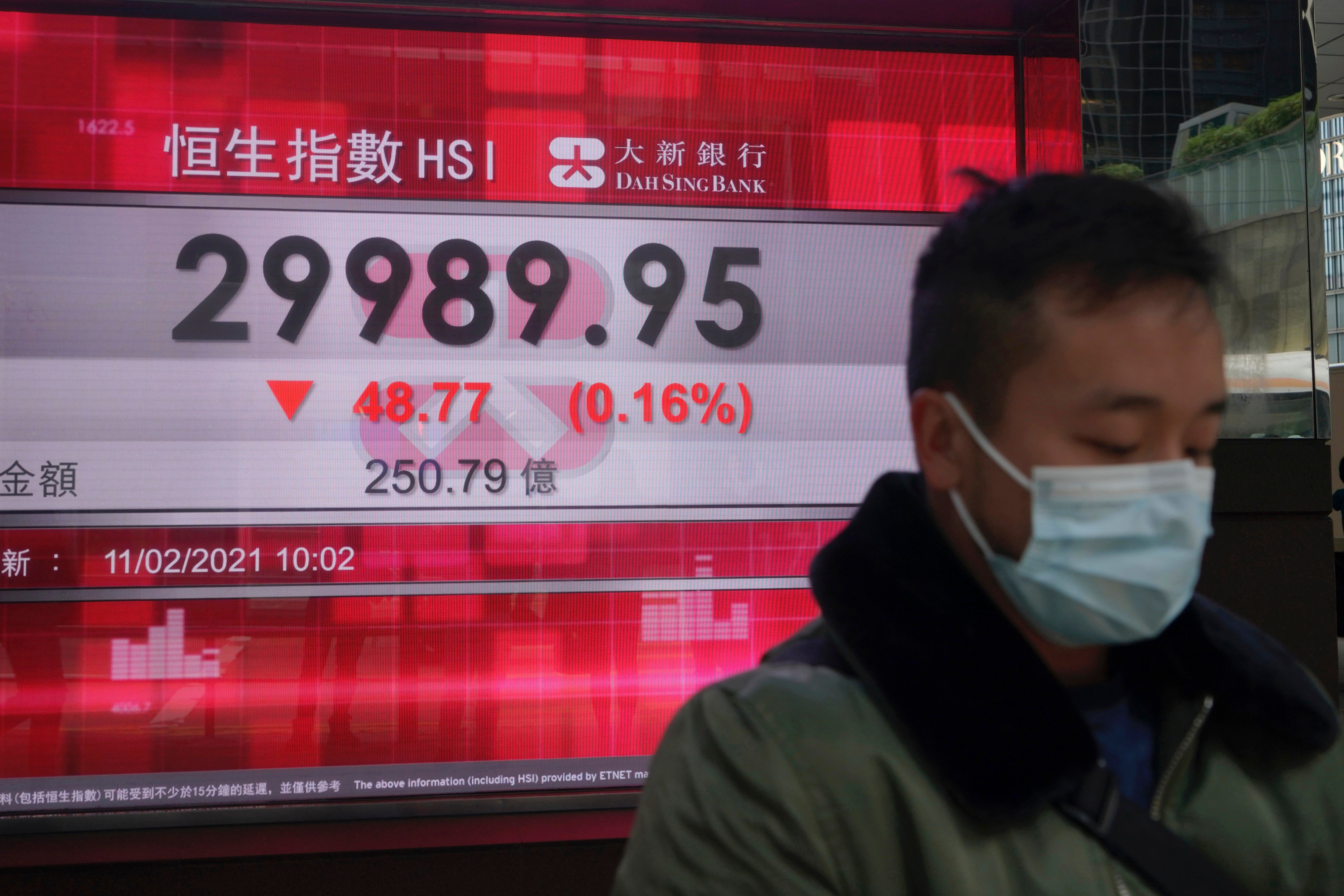Asian shares mostly gain after Biden speaks with China's Xi
Major Asian stock indexes are mostly higher after President Joe Biden held his first talk with Chinese leader Xi Jinping since taking office

Your support helps us to tell the story
From reproductive rights to climate change to Big Tech, The Independent is on the ground when the story is developing. Whether it's investigating the financials of Elon Musk's pro-Trump PAC or producing our latest documentary, 'The A Word', which shines a light on the American women fighting for reproductive rights, we know how important it is to parse out the facts from the messaging.
At such a critical moment in US history, we need reporters on the ground. Your donation allows us to keep sending journalists to speak to both sides of the story.
The Independent is trusted by Americans across the entire political spectrum. And unlike many other quality news outlets, we choose not to lock Americans out of our reporting and analysis with paywalls. We believe quality journalism should be available to everyone, paid for by those who can afford it.
Your support makes all the difference.Major Asian stock indexes were mostly higher on Thursday after President Joe Biden held his first conversation with Chinese leader Xi Jinping since taking office.
Many markets in Asia were closed for the Lunar New Year and other holidays. Benchmarks in Hong Kong, India rose, Singapore was flat and Sydney and Bangkok declined.
With much of Asia celebrating the traditional start of the Year of the Ox, there is little in the way of fresh market driving news likely for the rest of the week from the region.
In their phone conversation, Biden and Xi appeared to have struck a conciliatory tone, Jeffrey Halley of Oanda said in a commentary.
U.S. officials have signaled Washington will keep in place export restrictions on technology and tariffs imposed by the previous administration of President Donald Trump.
But investors and businesses in the region are hoping a more even-keeled approach to relations between the two biggest economies by the Biden administration might help minimize future shocks to trade and investment.
“The new normal remains mostly intact, although financial markets long-ago took it in their stride," Halley said. “The initial contact appears to have been civilized though, and for that, the rest of the world can be grateful."
Markets have been lifted by surprisingly good company earnings reports, indications that a recent surge in new coronavirus cases is easing, progress in the distribution of vaccines and signs that lawmakers in Washington are moving toward delivering another financial boost for the economy.
A U.S. government report released Wednesday showed that inflation remained tame last month, reassuring investors that the economy can absorb more stimulus without overheating.
Hong Kong's Hang Seng gained 0.5% to 30,173.57 and the Sensex in India edged 0.2% higher to 51,421.44. In Australia, the S&P/ASX 200 slipped 0.1% to 6,850.10. Markets were closed in Tokyo, Taiwan, Seoul and Shanghai.
On Wednesday, the S&P 500 slipped less than 0.1% to 3,909.88 after swinging between a gain of 0.5% and a loss of 0.7%. Nearly 60% of the companies in the benchmark index rose, though a slide in technology stocks and companies that provide consumer services and products kept those gains in check.
The Dow rose 0.2% to 31,437.80. The Nasdaq lost 0.3% to 13,972.53. The Russell 2000 index of small companies fell 0.7%, to 2,282.44.
The Labor Department said Wednesday that U.S. consumer prices rose 0.3% in January, led by a surge in energy. It was the biggest monthly increase since July, but inflation over the past year has remained a modest 1.4%. Core inflation, which excludes volatile food and energy costs, is also up 1.4%, with core prices unchanged in January.
The yield on the 10-year Treasury note fell to 1.13% from 1.15% late Wednesday. It was as a high as 1.20% earlier this week.
Investors have started watching inflation metrics more closely as Democrats in Congress prepare to inject $1.9 trillion of stimulus into the economy. U.S. businesses are starting to reopen and millions of Americans are now vaccinated, meaning there could be a surge of economic activity that could drive prices higher.
Cannabis stocks surged as members of the same online forum that hyped up GameStop, AMC Entertainment and other beaten-down companies in recent weeks began encouraging each other to snap up shares in marijuana companies.
Canadian cannabis company Sundial Growers vaulted 78.8%. The stock is up more than 500% so far this year. Shares in Aphria and Tilray, Canadian companies that agreed to combine in December, also rose. Aphria gained 10.7%, adding to its 280% gain this year, while Tilray jumped 50.9%. It's up more than 670% this year.
Marijuana stocks had been surging before becoming the latest darling of online investors as more states moved last year to allow legal sales. The stocks are also benefiting from optimism that industry friendly legislation measures could become law under the Biden administration. Last week, Democratic leaders in the Senate reiterated their intention to move on comprehensive cannabis reform in the current legislative session.
Shares in GameStop and AMC Entertainment, which have been recently pulling back sharply from their runup at the end of January, rose 1.8% and 5.5%, respectively.
In other trading Thursday, U.S. benchmark crude oil lost 32 cents to $58.36 per barrel in electronic trading on the New York Mercantile Exchange. It picked up 32 cents to $58.68 on Wednesday. Brent, the international standard for pricing crude oil, declined 34 cents to $61.13 per barrel.
The U.S. dollar weakened to 104.58 Japanese yen from 104.59 yen. The euro rose to $1.2135 from $1.2120.
___
AP Business writers Ken Sweet, Damian J. Troise and Alex Veiga contributed. AP Economics Writer Martin Crutsinger contributed to this report from Washington.